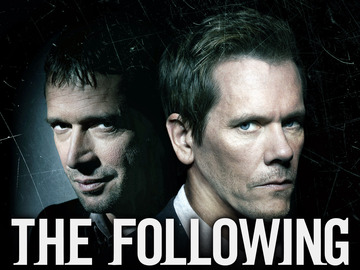Search This Blog
dinsdag 22 januari 2013
'The Following' Review: Art Imitates Death
The creator of Monday night's new Kevin Bacon series, "The Following," writes what he knows. And what he knows is writing. So it makes sense that his on-screen villains try to honor horror conventions by killing the right characters in the right ways, like the slashers in his "Scream" films. The victims, many of them wise to the rules of horror, try to subvert conventions by staying alive.
Williamson's latest bad guy, college–professor turned serial killer Joe Carroll (James Purefoy), may be Williamson's biggest horror traditionalist. Rather than replicating 80s slasher flicks, he pays homage to the stories of Edgar Allen Poe.
The literary angle is supposed to class up the following, and add an intellectual sheen to Williamson again doing what he's been doing for years. By acknowledging his repetition of horror clichés, he gets to have it both ways: To scare us while acknowledging we're falling for very old scares.
We can be generous (and pretentious) and call it a meta-critique of the genre, or we can just admit that every story, to succeed, has to acknowledge the ones that came before, and do something new.
The main hook of the "The Following" is the idea that Carroll is so unique and charming a killer that he has hordes of groupies willing to give their lives to carry out his schemes, even as he manipulates them from behind bars. You've seen this idea before, if you've seen "Manhunter" or its remake, "Red Dragon," both based on Thomas Harris' first book about Hannibal Lecter.
Lecter, while locked up, had to use some clever manipulation of telephone operators to send messages to murderer Francis Dolarhyde. Because one convention of serial killer dramas is that they are sometimes blessed with shockingly lax security once captured, Carroll is able to reach his followers online.
Sure, why not.
Carroll has other similarities to Lecter, who would no doubt be perturbed that Fox's "The Following" made it to air before his own upcoming NBC series, "Hannibal." Both Carroll and Lecter are charming intellectuals who see murder as some sort of higher calling. For Carroll, murder is supposed to be art.
The writer-as-killer notion will be tolerable and maybe even interesting if "The Following" does more than just reintroduce it. We get the idea: Both writers and murders seek total control over the poor characters they forcefully enlist in their narratives. And both inspire others.
Williamson's influence is obvious in the horror genre: Since "Scream," nearly all horror movie characters have to acknowledge that they feel stuck in a horror movie. And Carroll, like Lecter, Charles Manson and countless other killers real and fake, unfortunately draws his imitators.
But in "The Following," Williamson feels like he's occasionally simplifying some of his ideas, and selling them by having characters say silly things. Bacon, as tortured, hard-drinking ex-FBI agent Ryan Hardy, has to tell Carroll: "If this book ends with anything other than your death, you better plan on a rewrite."
The frequent reminders that all of this is fiction are helpful given the bloodshed onscreen. Prison guards are slashed, many women are stabbed, eyes are plucked out. I'm hard pressed to think of a bloodier broadcast TV show.
Interestingly, "The Following" arrives in the midst of yet another debate about whether screen violence perpetuates real violence. We're worried about whether death imitates art, as it does in "The Following."
Fox entertainment chairman Kevin Reilly has largely begged off on the issue of whether fake violence begets real violence, while pledging to keep his shows within broadcast-TV limits. Talking to reporters and critics earlier this month, he was peppered with questions about the Newtown, Conn., killings. Eventually he demurred, saying he didn't want to say any more on the subject.
Your humble correspondent tried to take a different approach: Did he believe that any film or TV show had ever inspired someone to kill who wouldn't have otherwise?
"Are you serious?" Reilly responded, begging off again.
Well, yes, I was. I find it hard to believe that any healthy, normal person has been inspired to lash out because of something they've seen on TV or film. But it does seem possible that someone with existing violent tendencies might think of new ways to act them out after seeing some novel form of violence onscreen. (After Monday night's episode of "The Following," protect your eyes in the presence of psychos.)
It will be nice if "The Following" can say something about the effects of violent entertainment -- or say something about anything, really -- so that its fake bloodshed will serve some greater purpose than entertainment.
"Silence of the Lambs" isn't about cannibalism, but about empathy and lack of it. Bad guy Buffalo Bill, as Clarice Starling notes in the novel, is a thing that feeds on human tears. Lecter instantly understands most people he meets, but has zero affection for them. Clarice, his opposite, thrives by relating to others: She alone knows where to look in a victim's bedroom for the clue that leads to the killer. The bloodshed gets our attention, but what stays with us are the characters.
In Charlie Kaufman's "Adaptation," Charlie's brother, Donald, sells one of those terrible psychological-thriller spec scripts that "Silence" begat by the thousands. His script, called "The Three," is about a killer, victim and chief investigator who are all the same person.
Charlie presses Donald on what it means, and Donald explains that is doesn't mean anything – it's just "f---ed up." He means it in a good way – it's a crazy idea to blow minds.
So far, "The Following" is kind of f---ed up, in the Donald Kaufman sense. There's a concept there, yes, but it doesn't really blow our minds.
And that concept leaves us to wonder, like Charlie did: Is that really all there is to it?

